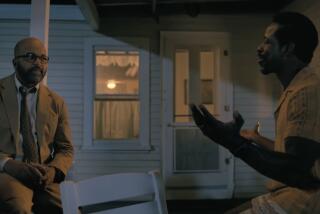Dark Passages: Pursued by the âcrookedâ past
There is no greater joy than when an author whom youâve long admired produces his or her best work to date. Already in this columnâs pages â real or virtual â Iâve sung the praises of Don Winslow for âSavages,â his literary approximation of a narcotic jolt, and of Emily St. John Mandel for training an astute eye on contemporary anxiety among emerging adults with âThe Singerâs Gun.â Now Iâm back in that state of wondrous reading pleasure thanks to a new, years-in-the-making novel by Tom Franklin.
Franklin first attracted deserved notice with the compendium of award-winning short stories rounded up in his 1999 collection âPoachersâ and later with âHell at the Breechâ (2002), a moody historical novel thick with southern Georgia settings and characters well-practiced at shattering illusions â othersâ and their own. Then came âSmonkâ (HarperPerennial: 272 pp, $13.95 paper) which ratcheted up both the comedy and the violence as a bloody-minded psychopath cuts a wide swath through the American West, building up wild myths and tall tales for others to tell when the truth is more complex, and even more entertaining.
Franklinâs writerly range takes yet another startling turn with âCrooked Letter, Crooked Letterâ (William Morrow: 274 pp., $24.99), the title derived from the mnemonic that helps Southern children spell the word â Mississippiâ: âM,I, crooked letter, crooked letter, i, crooked letter, crooked letter, i, humpback, humpback, i.â (Franklin includes the extended phrase as an epigraph to begin the novel.) The memory jingle is suitably nonsensical on the surface to provoke sly grins or groans among the children forced to learn it by heart, but it has deeper resonance as a way to tie together two young boys whose unlikely friendship ended up thwarted, only to meet again as adversaries on a collision course with tragedy.
Nowadays, Silas Jones is the chief of police for the small town of Chabot, Miss., a quiet leader for a locale that needs him, and an upright citizen well-enough removed from shakier roots growing up the sole child of a black single mother. Larry Ott, on the other hand, never left his home, and at the age of 41, lives alone âin his parentsâ house, which was now his house, though he couldnât bring himself to think of it that way. He acted more like a curator, keeping the rooms clean, answering the mail and paying bills, turning on the television at the right times and smiling with the laugh tracks, eating his McDonaldâs or Kentucky Fried Chicken to what the networks presented him and then sitting on his front porch as the day bled out of the trees across the field and night settled in, each different, each the same.â
What would lead a man to such mind-numbing, repetitive existence? The answer has a lot to do with what Silas and Larry were to each other nearly 30 years before, boys of different color and of parents either suspicious or downright prejudiced toward the other race, whose tentative overtures of friendship are forged through hunting, trading comic books and Stephen King novels, and a vague sense that race matters much less than finding someone to trust. Franklin depicts Silas and Larryâs budding mutual confidence with grace and understanding of how teen boys relate to each other and the wider world around them, cajoling the reader to root for them to stay true friends for the duration.
Instead, circumstance and a misguided sense of loyalty cause Silas to leave town and Larry to be blamed for the disappearance of a local girl. Locked away like the proverbial hermit, Larry is an easy target of suspicion when another teen vanishes, bringing Silas back to his hometown under the legitimate guise of professional business. That flimsy facade soon falls away to reveal Silasâ pervading sense of guilt, both over the abrupt end of the friendship and over his inability to make an outright judgment about Larryâs culpability in the crimes past and present.
Had this been a more standard commercial novel, the seams in the storyline of âCrooked Letter, Crooked Letterâ would have tore under the strain of shoehorning Larry and Silas into more conventional figures following a standard route of conflict, separation and redemption. Franklin, however, refuses to adhere to convention, even if crime genre tropes allow for a suspenseful narrative and some surprises about who committed the murders.
His larger aim is to comment on how misunderstandings multiply into easily averted tragedy; how generations-old racism is a scourge that only needs a few small souls to stamp it out, whether they know it or not; how small gestures are full of loaded meaning; and how childhood thoughtlessness â the good and the bad â can be amplified with the greater context of adulthood.
Itâs how Silas, late in the book, ponders his long-ago school bus rides while sitting in the back of a city bus in his current home: âNow look out. Nothing but a gully of weeds and garbage. Everything frozen. Was that what childhood was, things rushing by out a window, the trees connected by motion, going too fast for him to notice consequences? If so, what was adulthood? The bus stopping? A man in his forties, slammed with his past, the kudzu moving faster than he was?â
For Silas, who tried running and failed, and for Larry, who stayed put and failed, the answer might fall somewhere in between stasis and motion. And for readers, the answer is certainly âCrooked Letter, Crooked Letter,â a wise and gripping account of manhood and boyhood that frames what we think we know in a greater context of revelation and surprise.
Weinman blogs about crime and mystery fiction at https://www.sarahweinman.com. âDark Passagesâ appears monthly at latimes.com/books.
More to Read
The biggest entertainment stories
Get our big stories about Hollywood, film, television, music, arts, culture and more right in your inbox as soon as they publish.
You may occasionally receive promotional content from the Los Angeles Times.










